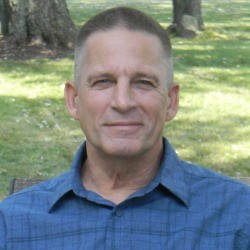29-Year Pancreatic Cancer Survivor: “I’m just a regular guy.”

When John Christman’s doctors diagnosed him with pancreatic cancer in 1989, he was what he calls “just a regular guy.” He was 33 years old, poured concrete for a living, and had a wife and 2 children at home, ages 1 and 3 years old. At one point, his doctors gave him only 30 days to live, and so he told his family his good-byes. Today Christman is 62, recently retired, and looking forward to a long, fun life with his grandchildren. People he knows from his days in treatment call him “Mr. Miracle.” He still calls himself, “just a regular guy.”
Back in 1989, Christman didn’t feel like himself and spent months going from doctor to doctor, trying to figure out what was wrong. Mostly he lacked energy. Once during a softball game, he was so tired he didn’t want to finish playing. Another time, he came home early from deer hunting. “That wasn’t me,” he says.
Aggressive treatment
Christman chose Madison University Hospital in Wisconsin as his treatment center because it was closest to home. Doctors scheduled him for a Whipple procedure an extensive surgery that removes parts of the pancreas, bile duct, and small intestine, and sometimes other nearby organs. But when the surgeon saw Christman’s tumor, he realized its size and position would make the procedure impossible. He did not perform the surgery. Doctors told Christman his next best option for treatment was aggressive chemotherapy . But they did not have high hopes.
And there were complications. Christman was experiencing internal bleeding and required several surgeries to get it under control. Doctors knew waiting 6 weeks after the surgeries before starting chemotherapy would give him time to heal, but they decided to begin right away because they were afraid if they didn’t, he wouldn’t live another month. Years later during a follow-up appointment, a doctor told Christman they’d prescribed him the strongest chemo regiment they’d ever given anyone. They’d held out a little hope that because he was young, he’d be able to tolerate it.
Once a week for 7 months, Christman drove himself 1 hours to Madison to be infused with the chemo drugs cisplatin, 5-FU, and VP-16. By the time he got home after each appointment, he was throwing up. He had already lost 60 pounds in January, and the chemo was weakening himfurther.
“I lived in the living room. My wife had to give me a bath. I was skin and bones,” he said. “Before this, I had been able to bench press 300 pounds, and here I was limping around the house like an 80-year-old man.”
The treatment took an emotional toll as well. Christman couldn’t work, and because of a weakened immune system, he had to isolate himself from his friends and had to wear a face mask. Even playing with his children was tricky. They were too young to be careful of the catheter in his chest. He and his wife took advantage of support groups and counselors at the hospital. He says the care they received was excellent.
No evidence of cancer
Despite the odds, Christman’s tumor began to shrink. He continued chemo until July 1990. After that, all his bloodwork and scans showed no cancer. Christman says the big circle on his MRI reports showing the location of his tumor was suddenly no longer there. He was able to switch his care to Racine, closer to home, for his follow-up care.
Christman began to gain back his strength and returned to work, though he switched to heavy equipment because it was less labor intensive than working in the field. During the next 10 years, he had severe ulcers, a side effect from treatment, and underwent several surgeries. But his cancer has never returned.
Because there aren’t a lot of stories like his, Christman says when friends have friends diagnosed with pancreatic cancer, they often call him for advice and support. “The thing about cancer is you have nothing to reach out to grab and shake,” says Christman. “It happened. A lot of people need to be angry. But you have to accept it and move on.”
Christman says he wants to share his story with more people to give them inspiration and hope when it’s often hard to find. “I just wanted to put my story out there to the regular people,” he said. “I could never find patients like me discussing what they went through. Nobody believes it, but I’m still here. I tell people we never gave up.”
_______________________________________
How can you help?
Support the Coaches Vs. Cancer Auction at the BCA March Madness Event on Thursday, March 21st. 100% of the proceeds will directly benefit the Philadelphia chapter of Coaches Vs. Cancer.
Can’t Attend? No Problem!
_______________________________________________________________________
The BCA March Madness Event powered by Gibbons P.C. is a private event for BCA members and their invited guests, attendance is by invite only. No walk-ups will be permitted at the door. Every attendee must have a ticket registered in our system to receive entry.
